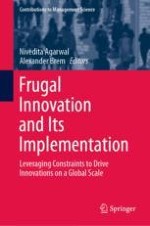This book discusses several product development strategies and tools employed by organizations around the world to implement frugal innovations. Over the past decade, frugal innovations have caught the attention of countless management scholars. This book comes at the right time for academics and practitioners alike, as it explores how the concept of frugal innovation has evolved over the past several years and is shifting its focus from merely featuring ‘cost’ driven innovations to being more ‘resourceful’ and ‘sustainable’ at its core. Furthermore, in light of the ongoing digital revolution and emergence of new business models such as sharing economy and circular economy, the book highlights recent and upcoming trends and their impacts on frugal innovation strategies.
